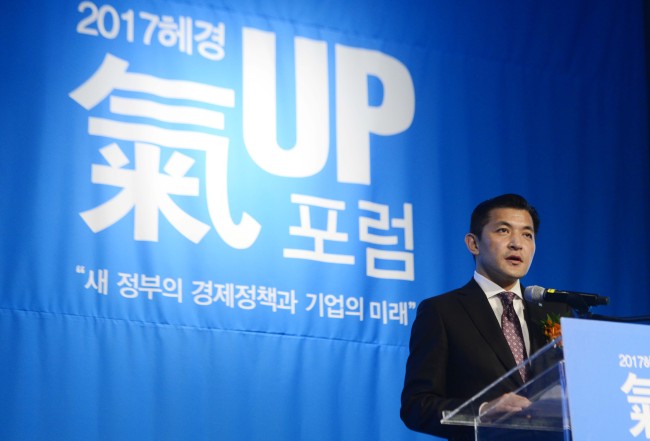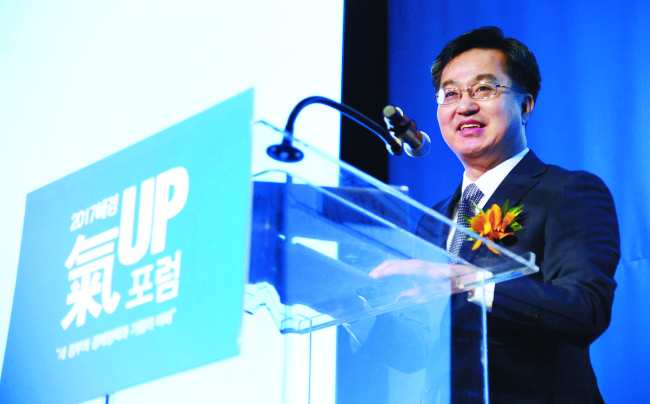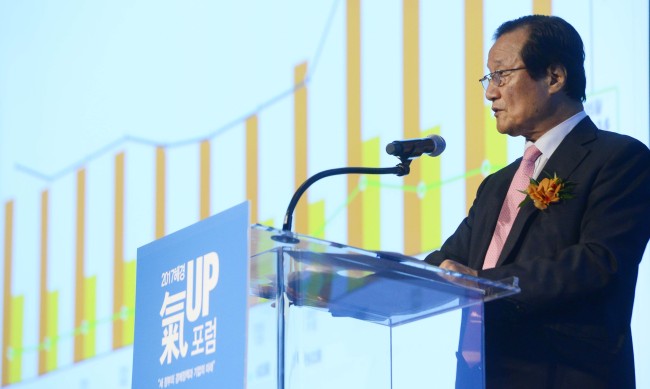South Korea needs to address chronic problems in its economic structure in order to achieve sustainability in economic reforms, including those of family-run business groups known as chaebol by the new government, experts voiced at a forum on Wednesday.
Around 300 government officials including Deputy Prime Minister for Economic Affairs Kim Dong-yeon, executives of major businesses, and economic scholars gathered at the 2017 Herald Business 氣UP Forum, a business policy conference, held at the Four Seasons Hotel Seoul to discuss and suggest desirable directions for the Moon Jae-in government in carrying out its planned chaebol reforms. The participants also addressed low growth problems including the highest-ever youth unemployment rate and preparations for the “fourth industrial revolution” with new growth engines. The name of the forum takes a spin on the Korean word “gi-eop” meaning companies by combining a Chinese character 氣(gi) meaning vigor and English word “up.”
 |
Herald Corp. Chairman Jungwook Hong delivers a speech at a business policy forum hosted by The Herald Business in Seoul on Wednesday. (Park Hae-mook/The Korea Herald) |
Herald Corp. Chairman Jungwook Hong in his welcoming speech called for a balanced cooperative model between the government and companies in the face of changes stemming from growing protectionism, the fourth industrial revolution and the Korean government’s chaebol reforms.
“It will be difficult for Korean businesses to seek growth if political pressures continue to weigh on them,” Hong said.
“The government should neither be a minimalist that overlooks unfairness nor a maximalist that suppresses market economy. A new balanced cooperative model between the government and businesses is in desperate need to help companies weather through the harsh business environment at home and abroad.”
Deputy Prime Minister Kim Dong-yeon, in his speech, underscored the importance of establishing fair orders agreed both by the government and businesses in creating a co-prospering economic ecosystem in his congratulatory speech.
“The new government pursues three pillars in its economic policies, which can be successful only if companies cooperate,” Kim said.
 |
Deputy Prime Minister Kim Dong-yeon speaks at a business policy forum hosted by The Herald Business in Seoul on Wednesday. (Park Hae-mook/The Korea Herald) |
Kim introduced people-centered investment, fair competition and innovative growth as the three pillars.
“Companies are not only front-runners of innovative growth, but also the fundamentals,” Kim said. “The government will support businesses to achieve innovation and growth in an open, competitive market by giving consistent messages with high predictability about government policies.”
Two key issues the Moon government inaugurated in May have been to create jobs and reform chaebol.
In recent years, Korea has been experiencing unprecedentedly high youth unemployment -- 9.3 percent as of May -- due to decreased investments by local businesses amid low economic growth of less than 3 percent.
President Moon proclaimed to be a “job creating president,” vowing to root out fundamental causes of the current jobless problem, including the so-called “accumulated evils” in old practices by local business tycoons.
Moon has appointed shareholder activist Kim Sang-jo chairman of the Fair Tarde Commission to execute the government’s chaebol reform plans.
Yoon Jeung-hyun, former finance minister during the Lee Myung-bak government, stressed the government should let the private sector lead reforms to create jobs, while supporting companies with long-term, seamless economic policies.
“The private sector is at the center of job creation,” Yoon said. “Extra spending by the government cannot provide sustainable solutions for job creation.”
 |
Former finance minister Yoon Jeung-hyun delivers a speech at a business policy forum hosted by The Herald Business in Seoul on Wednesday. (Park Hae-mook/The Korea Herald) |
Economic experts focused on the Moon government’s chaebol reform plans in the first session of the one-day forum.
“The government hasn’t yet provided details of its reform plans, which may give the market misleading signals,” said Park Sang-in, public administration professor at Seoul National University. “The government needs to come up with specific measures to ban chaebol owners from employing expedients to reinforce their control over business groups and to help secure transparency in their governance structures.”
Park proposed the launch of a pan-government organization that will lead the government’s chaebol reform plans with an aim to legislate concrete measures before the 2018 provincial elections.
Kim Hyun-jong, head of corporate research at the Korea Economic Research Institute, urged the Moon government to refrain from populist policy measures to reform the business community.
“Due to changes in government policies on corporate governance structures every five years, large business groups faced high uncertainties that mounted pressures on them to obey new regulations of each government,” Kim said. “Successful reforms of corporate governance in advanced countries accompanied globalization, competition/deregulation and minimum government intervention.”
The Moon government’s chaebol reform plans include minimizing owners’ control across their affiliates through unfair internal transactions and cross-shareholding practices. Also, President Moon had pledged to turn irregular workers into full-time workers.
But for the past six weeks, the government faced criticism for its heavy-handed reaction to some business circles about the issue of irregular workers, which raised concerns about a communication rift between the government and business community and possible introduction of new regulations.
By Song Su-hyun (
song@heraldcorp.com)










